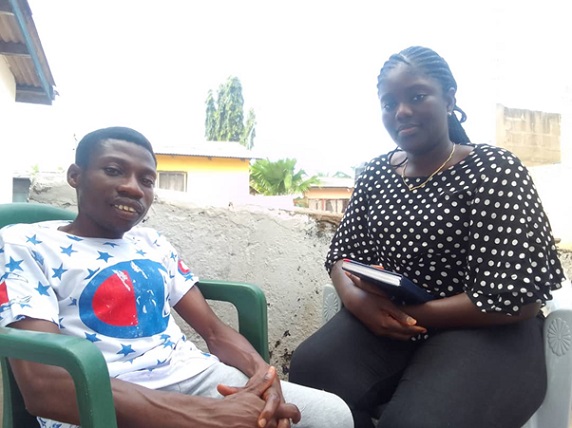Tsotsoo in a photograph with Emmanuel
Kyphosis, also known as hunchback or dowager’s hump, is a medical condition characterized by an excessive outward curvature of the spine, leading to a hunched or rounded posture. It most commonly affects the upper back or thoracic spine, resulting in a noticeable hump in the upper back.
The spine has a natural curve that allows people to stand upright and provides balance. This excessive curve is called “hyperkyphosis.” Hyperkyphosis can be caused by various factors, including poor posture, osteoporosis, degenerative conditions affecting the discs and vertebrae, neuromuscular disorders, and birth defects. It can cause back pain, stiffness, limited mobility, and difficulties in severe cases.
At age ten, I realized that my cousin Emmanuel, suffered from Kyphosis. My first glance at him made me feel scared and I could not even talk to him at that point. However as days passed by, my relationship with him grew from the initial stranger to one that is more friendly.
The community mocked Emmanuel and called him names like “afutse”, “Akpatse” due to his condition and some family members avoided him.
In my quest to know more about what led to his condition and how he has survived with the stigmatization, Emmanuel revealed that he was not born with the condition but rather on one faithful Sunday morning when his mother had taken him to church, she left him lying down since he was sleeping.
But to his mother’s surprise, a black goat stepped on his chest, making him scream. He added that days after the incident, his condition became serious and he needed medical attention. However, his father restricted him from hospitalization because of his faith.
“I was neglected by my father and some of my family members because they thought I was a curse,” he said. He also added that his condition progressed and his health issues became abnormal, which led to him being paralyzed.
“Leaving with a single parent is a difficult situation since my feeding, schooling, and other necessities have become impossible to cover. Attending school became difficult for me because my mother couldn’t afford it. But with the help of the ‘Hope for All Disability Foundation,’ I got enrolled in school.
Dr. Theophilus Thompson, a Physician at the Manna Mission Hospital indicated that Kyphosis is the abnormal curvature of the back. He also said that there is a normal Kyphosis in the spine. There is a degree of curvature allowed but when the curvature exceeds normal, it becomes problematic.
Dr. Thompson also established that some of the causes of Kyphosis could be congenital factors which usually occur during pregnancy or as a result of neuro muscular problems which is also a disease that affects the individual’s muscles.
Dr. Thompson indicated that some of the preventive measures include the intake of Folic acid during pregnancy which helps in the development of the foetus and prevent congenital Kyphosis.
He added that for posture, some postural exercises are done to correct the movement and sitting posture of the person. Also for older people with osteoporosis, hormonal replacement therapy is done to correct the condition.
“We need to embrace people with Kyphosis and take them into our social life and avoid victimizing them since they have difficult in performing certain tasks,” he said.
People with obvious Kyphosis usually can be victimized. People see them as people with disability and if they are children, they may be subjected to bullying by other colleagues. Also, because of the difficulty in performing some tasks, they may not be involved in certain activities that other people may be involved.
Despite its physical effects, Kyphosis does not define the person. In fact, individuals with this condition often possess unique and inspiring personalities that deserve to be highlighted.
There is a need for society to desist from making persons suffering from the condition less of a human. It is about time we embrace them to society and treated them with the needed respect and care.
By Aritha Tsotsoo Ashitei (Unimac GIJ)
